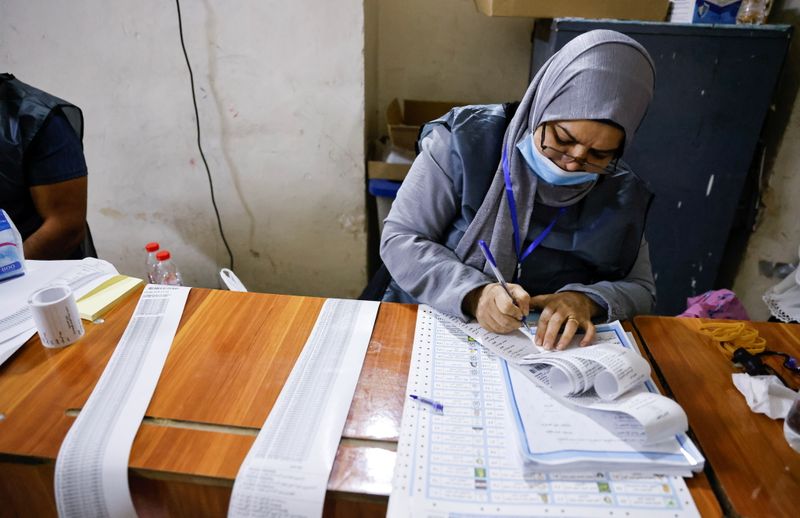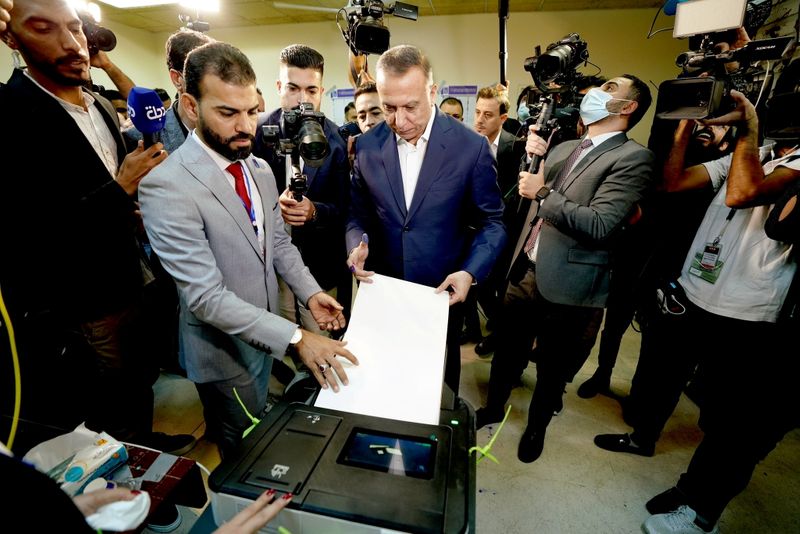By John Davison and Ahmed Rasheed
BAGHDAD (Reuters) -Initial turnout in Iraq's parliamentary election on Sunday was 41%, the electoral commission said, in a sign of dwindling trust in political leaders although participation was not nearly as low as election officials had earlier feared.
The established, Shi'ite Islamist-dominated ruling elite, whose most powerful parties have armed wings, is expected to sweep the vote, with the movement led by populist Shi'ite cleric Moqtada al-Sadr, who opposes all foreign interference and whose main rivals are Iran-allied Shi'ite groups, seen emerging as parliament's biggest faction.
Such a result would not dramatically alter the balance of power in Iraq or the wider Middle East, say Iraqi officials, foreign diplomats and analysts, but for Iraqis it could mean that a former insurgency leader and conservative Islamist could increase his sway over the government.
Total turnout was 44.5% in the last election in 2018. The electoral commission said early on Monday the lowest turnout was in Baghdad, with between 31% and 34%.
Two electoral commission officials told Reuters on Sunday that nationwide turnout of eligible voters was 19% by midday and
participation was low at polling stations in several parts of the country visited by Reuters.
Commission official Muhammad Mustafa said turnout picked up in the final hours of voting.
Initial results are expected on Monday.
Iraqi elections are often followed by protracted talks over a president, a prime minister and a cabinet under the democratic system brought in by the 2003 U.S.-led invasion.
In Baghdad's Sadr City, a polling station set up in a girls’ school saw a slow but steady trickle of voters.
Election volunteer Hamid Majid, 24, said he had voted for his old school teacher, a candidate for the Sadrists.
“She educated many of us in the area so all the young people are voting for her. It’s the time for the Sadrist Movement. The people are with them,” Majid said.
The election was held several months early under a new law designed to help independent candidates - a response to widespread anti-government protests two years ago.
"Jockeying and government formation will look the same - the same parties will come to either to share power and not provide the population with basic services and jobs and on top of that will continue to silence dissent. It’s very concerning," said Renad Mansour of the Iraq Initiative at Chatham House.
FOREIGN INFLUENCE
The United States, Gulf Arabs and Israel on one side and Iran on the other compete to influence Iraq, which provides Tehran with a gateway to back armed allies in Syria and Lebanon.
The 2003 invasion toppled Saddam Hussein, a Sunni Muslim, and catapulted to power majority Shi’ites and the Kurds, who were oppressed under the autocrat. It unleashed years of sectarian violence, including the takeover of a third of the country by Islamic State between 2014 and 2017.
High school teacher Abdul Ameer Hassan al-Saadi said he boycotted the election, the first parliamentary polls since the 2019 protests and subsequent crackdown. The demonstrations were brutally suppressed and some 600 people were killed over several months.
"I lost my 17-year-old son Hussain after he got killed by a tear gas canister fired by police during Baghdad protests," said al-Saadi, whose house is close to a polling station in the mainly Shi'ite Baghdad district of Karrada.
"I will not vote for killers and corrupt politicians because the wound inside me and his mother we suffered after losing our boy is still bleeding."
The chief Iraq election observer of the European Union, Viola von Cramon, said the relatively low turnout was significant.
"This is a clear, of course a political signal and one can only hope that it will be heard by the politicians and by the political elite of Iraq," she told reporters.
Nonetheless, some Iraqis were keen to vote in Iraq's fifth parliamentary vote since 2003 - and are hopeful of change. In the northern city of Kirkuk, Abu Abdullah said he arrived to vote an hour before polling stations opened.
"We expect the situation to improve significantly." he said.
Prime Minister Mustafa al-Kadhimi is not running for election but the negotiations after the vote could yet see him get a second term. Kadhimi, who is viewed as Western-friendly, has no party to back him.
The Kurds have two main parties that rule the autonomous Kurdistan region, and Sunnis this time have two main blocs.
Iraq is safer than it has been for years and violent sectarianism is less common since Iraq vanquished the Sunni ultra-hardline Islamic State in 2017 with the help of an international military coalition and Iran. But corruption and mismanagement have meant many of Iraq's 40 million people lack jobs, healthcare, education and electricity.
Baghdad-based political analyst Ahmed Younis said many Iraqis see the post-Saddam Hussein system of government - based on sectarian power-sharing - as a failure. And entrenched corruption and the growing power of unchecked militias deepened disillusionment.

"Boycotting eventually would be inevitable and that's what happened in today's election," said Younis.
At least 167 parties and more than 3,200 candidates are competing for parliament's 329 seats, according to the election commission.
